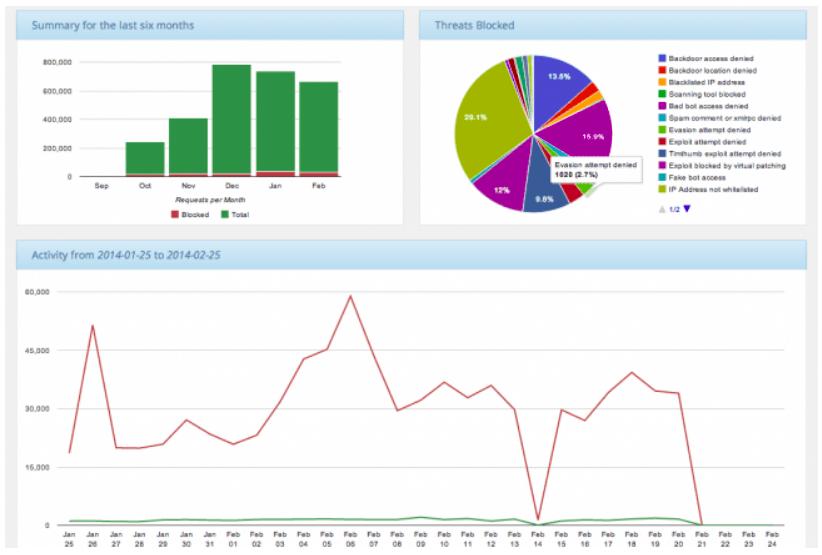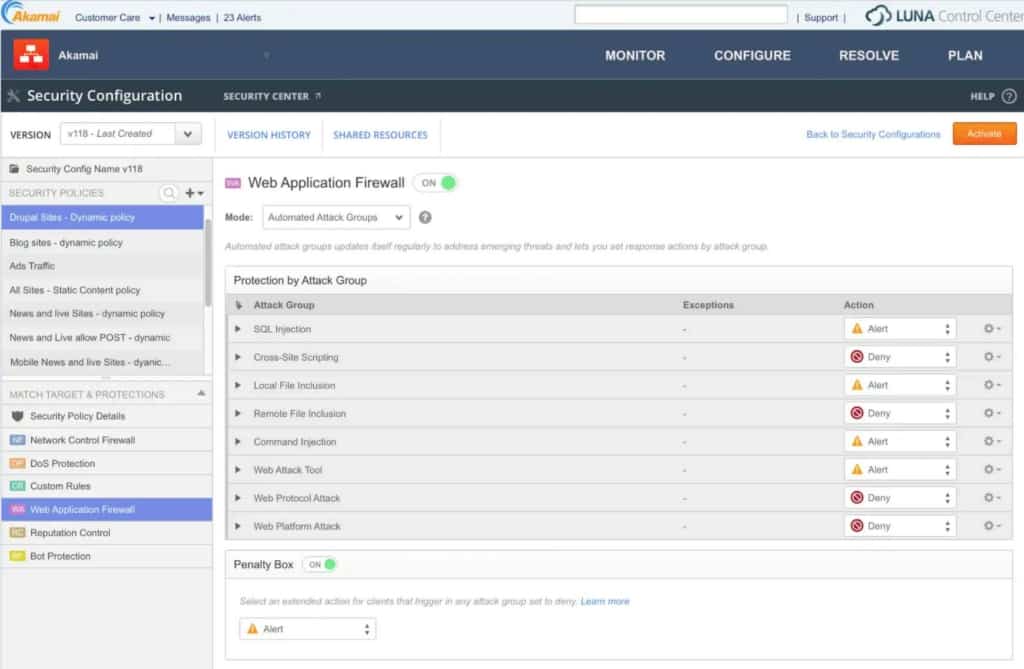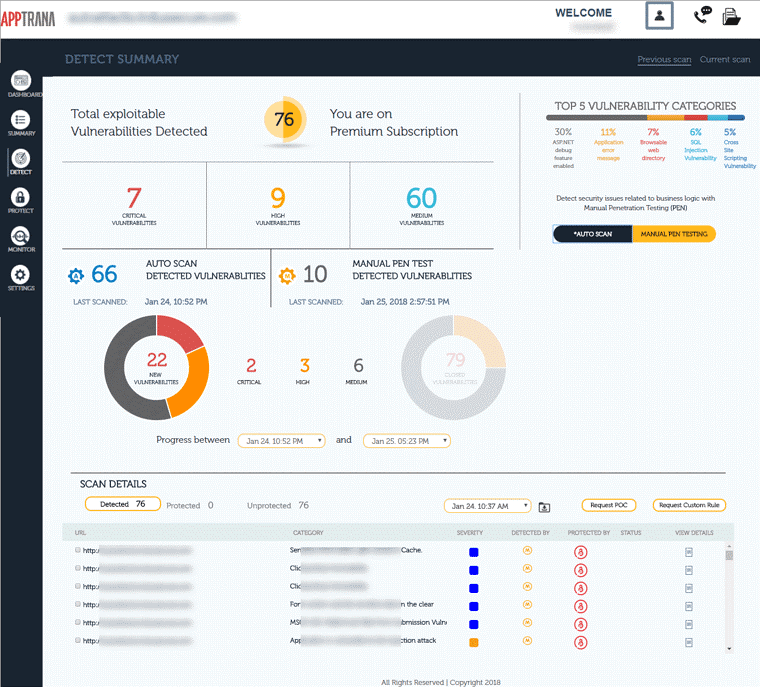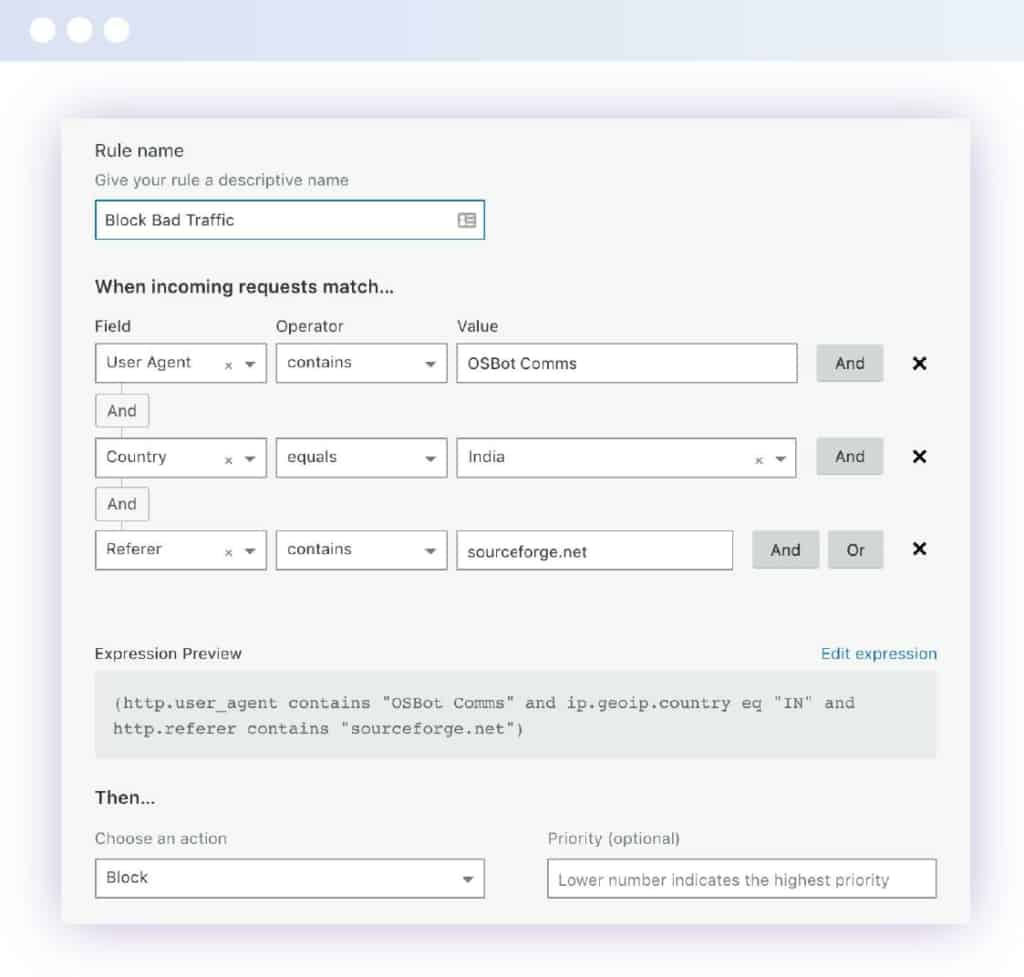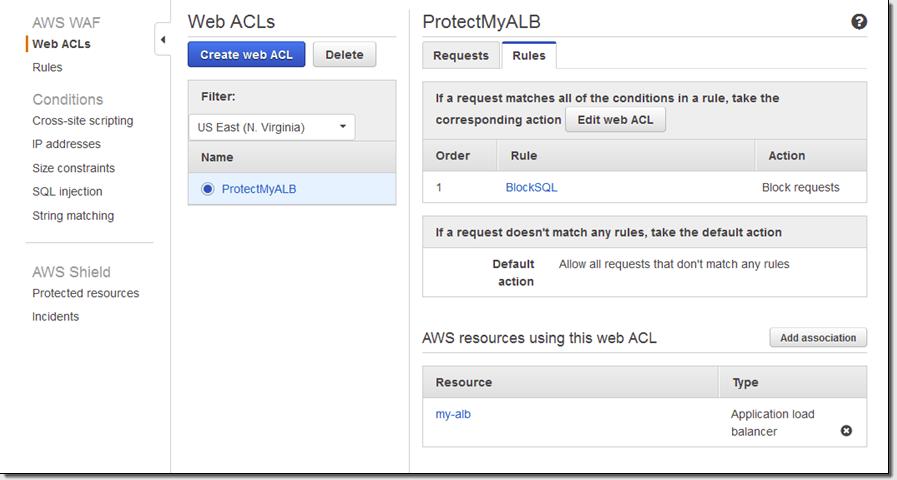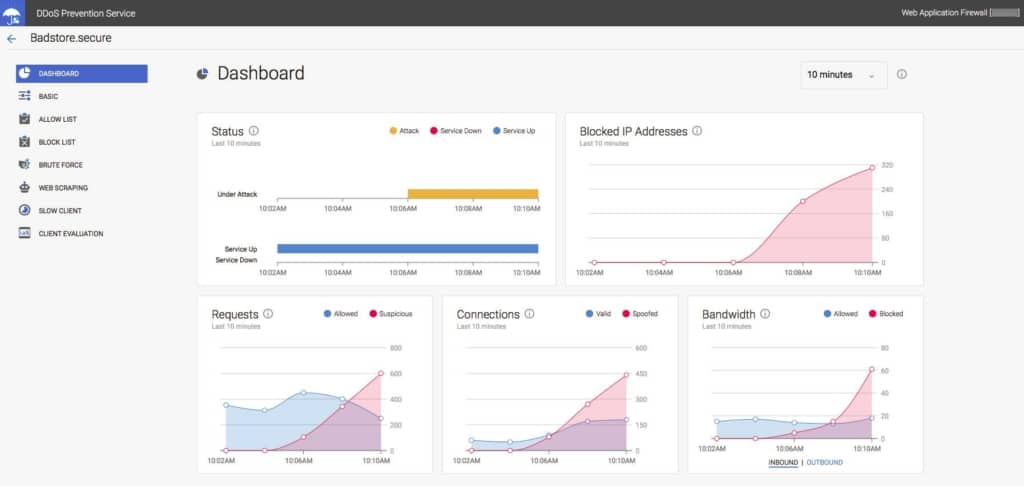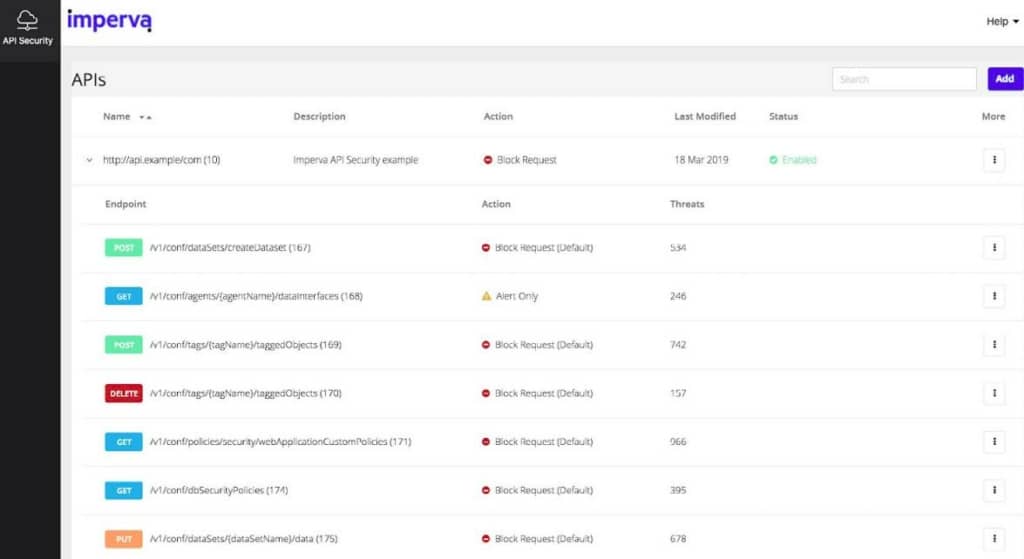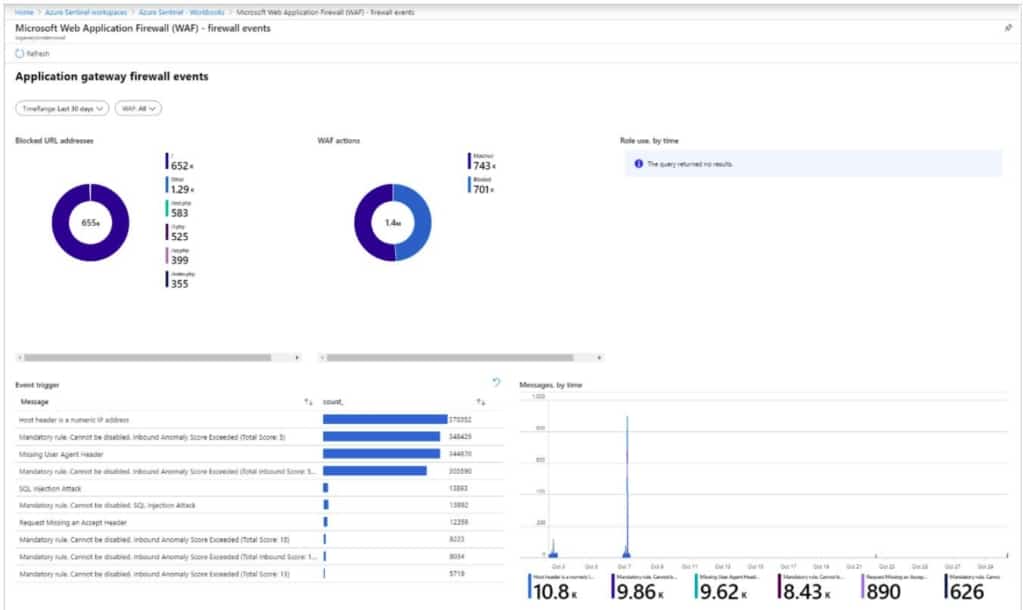It is safe to assume that web applications come with security vulnerabilities that make them vulnerable to hackers. Research shows that in most cases cross-site scripting (CSS) is at fault, so it is important that you have a protection mechanism that will protect your application from this type of attack.
Similarly, SQL injection and cookie poisoning are other possible attacks. Given the growing scale of these and similar attacks, you need a tool or strategy that would protect your web applications, and that’s where a specialized firewall will help.
A Web Application Firewall (WAF) is a service that protects your web applications from many application-level attacks like XSS and cookie poisoning.
Here is our list of the best WAFs:
- Sucuri A cloud-based WAF that not only blocks imminent threats but also increases the performance and availability of applications.
- Akamai Kona This scalable WAF does a good job at monitoring and preventing attacks.
- AppTrana Web Application Firewall Comprehensive system that continuously monitors traffic to and from an application to detect vulnerabilities and threats, and blocks them before they impact the system.
- Cloudflare Intelligent business system is ideal for protecting business-critical web applications.
- AWS WAF Resource-efficient way to monitor systems and to protect them.
- Barracuda WAF Protects websites, APIs, and mobile devices from possible attacks
- Imperva WAF Protects web applications by closely monitoring all data and traffic
- Azure WAF A cloud-native service that provides comprehensive protection for websites and applications.
Our methodology for selecting the best web application firewall tool:
We prioritize cloud-based solutions for ease of use and scalability.
- Emphasis on comprehensive malware detection and removal capabilities.
- Consideration of SEO spam and link injector repair functionalities.
- Evaluation of traffic filtering efficiency to prevent attacks.
- Assessment of support response times and quality.
The Best Web Application Firewalls
1. Sucuri
Sucuri is a cloud-based WAF that aims to prevent website attacks and possible hacks. It increases the speed of loading pages and increases your peace of mind regarding the web application’s availability.
Key Features:
- Removes website malware
- Due to continuously monitoring, it identifies black sites and submits for their removal
- Repairs SEO spam keywords and link injectors to ensure that your website looks great in search engines
- Filters malicious traffic
- Speeds up the loading time
- Uses scripts and tools to scan for malware
- Provides reliable support
Why do we recommend it?
After installing and navigating through Sucuri’s cloud-based WAF, we were particularly impressed with its real-time malware scanning and efficient DDoS mitigation features. The tool lived up to its promise of enhancing loading speeds while filtering malicious traffic effectively.
Who is it recommended for?
Sucuri is an excellent choice for businesses prioritizing web application security without sacrificing performance. It’s particularly beneficial for e-commerce platforms and content-heavy sites that need to maintain fast load times while also ensuring robust security measures are in place.
Pros:
- Prevents website attacks and hacks
- Increases website loading speed
- Continuous monitoring enhances web app availability
- Repairs SEO spam and link injectors
Cons:
- Limited scan frequency in basic plan
Pricing: Sucuri is available in three plans.
- Basic ($199/year) – Scans once every 12 hours and comes with advanced features such as DDoS mitigation.
- Pro ($299/year) – Scans once every six hours and comes with SSL certificate support, in addition to the features of the Basic plan.
- Business ($499/year) – Scan happens once every 30 minutes.
If you’re looking for a customized solution, reach out to the Sales team at 1-888-873-0817
Download: Click here for a 30-day free trial.
EDITOR'S CHOICE
Sucuri is our top web application firewall because it offers a robust and cloud-based solution for enhancing website security. It’s not just about preventing attacks; Sucuri significantly improves website performance by speeding up loading times, a critical factor in user experience. Its proactive approach to security includes continuous monitoring, identifying, and removing malware, and repairing SEO spam. This comprehensive coverage, combined with reliable support, makes Sucuri an invaluable asset for any website. Moreover, its tiered pricing structure caters to a wide range of needs, from basic security for smaller sites to intensive protection for larger businesses.
Download: Sucuri Download
OS: Cloud-based
2. Akamai Kona Web App Firewall
Akamai Kona Web App Firewall is a cloud-based platform that’s designed to protect any web app from threats. This firewall is highly scalable and continuously monitors applications to protect them from emerging attacks while maintaining its performance.
Source: Akamai
Key Features:
- Minimizes the risk of a data breach
- Designed to absorb or deflect some of the largest DDoS attacks
- Taps into Akamai’s global distributed architecture to ensure the application’s availability at all times.
- Adapts well to a changing threat landscape
- Continuously refines security rules
- Reduces operational expenses and provides good value for money.
Why do we recommend it?
We put Akamai Kona Web App Firewall through its paces and were impressed by its high scalability and continuous monitoring capabilities. The firewall adeptly minimized the risk of data breaches while also showing a strong ability to adapt to a rapidly changing threat landscape.
Who is it recommended for?
Akamai Kona is ideal for large enterprises with high-traffic web applications that require constant monitoring and have a need for scalability. Companies that are particularly concerned about large-scale DDoS attacks and wish to maintain optimal application availability will find this firewall to be an invaluable asset.
Pros:
- Protects against a wide range of web threats
- Absorbs large-scale DDoS attacks
- Utilizes global architecture for application availability
- Continuously updates security rules
Cons:
- Higher cost for multiple sites
Pricing: Pricing is based on bandwidth and the number of sites. The cost is $15,000 per month for up to five sites and 75Mbps
Download: Click here for a free trial.
3. AppTrana Web Application Firewall
AppTrana is a fully-managed system that protects the application layer from possible attacks by continuously monitoring traffic and blocking emerging threats. This fully-managed system comes with a host of convenient and customizable features as well.
Key Features:
- Continuously monitors applications to identify vulnerabilities
- Can be customized to meet the specific needs of your application
- Performs automated security scans and manual Pen-testing to identify possible vulnerabilities
- Handles patching
- Combines always-on security and accurate security rules to reduce false positives.
- Ensure round-the-clock availability
- Prevents DDoS before it happens
- Improves website performance
- Provides a 360-degree view of your application
Why do we recommend it?
After installing AppTrana’s free trial, we rigorously tested its automated security scans and manual Pen-testing capabilities. The tool excelled in identifying vulnerabilities, offering both always-on security and well-curated security rules that significantly reduced false positives.
Who is it recommended for?
AppTrana is a good fit for businesses that require a comprehensive, fully-managed security solution for their web applications. Organizations looking for a WAF that not only identifies vulnerabilities but also handles patching will find AppTrana to be a versatile choice. It’s also particularly useful for companies that desire a 360-degree view of their application’s security landscape.
Pros:
- Fully-managed system with continuous monitoring
- Automated security scans and manual Pen-testing
- Combines security and accuracy to reduce false positives
- Enhances overall website performance
Cons:
- Two pricing plans may not suit all needs
Pricing: AppTrana has two pricing plans and they are:
- Premium plan ($399/month) – Awfully managed site security
- Advance ($99/month) – Provides a comprehensive site security
Download: Click here for a free trial.
4. Cloudflare
Cloudflare is an intelligent and integrated WAF designed to protect business-critical web applications, without changing your infrastructure in any way.
Key Features:
- The onboarding process is fairly intuitive.
- The APIs make it easy to deploy
- Creates a proprietary threat score by analyzing digital signatures every day.
- Integrates well with popular toolsets for easy configuration
- Comes with customizable analytics and easy integration
- Enables you to create custom rules
- Integrates with the global Anycast network
- Provides high accuracy and reduces false positives
Why do we recommend it?
After setting up Cloudflare in a sandbox environment, we put its customizable analytics and custom rules features to the test. The tool effectively allowed us to create nuanced security configurations with ease, demonstrating its flexibility and adaptability.
Who is it recommended for?
Cloudflare is versatile enough to meet the needs of a broad spectrum of users, from small blogs to robust enterprise systems. Its high customization capabilities make it especially useful for organizations that require specific, detailed security configurations. The various pricing options ensure that businesses of all sizes can find a plan that suits their needs.
Pros:
- Daily digital signature analysis for threat scoring
- Customizable analytics and easy integration
- Reduces false positives with high accuracy
Cons:
- Enterprise plan may be costly for small businesses
Pricing: There are three pricing plans, namely,
- Pro ($20 per month) – Ideal for professional websites and blogs that require basic performance and security.
- Business ($200 per month) – A good choice for SMBs that have eCommerce websites requiring extensive security and performance.
- Enterprise (Custom pricing) – Comes with round-the-clock support, role-based account access, 100% uptime, access to raw logs, and more.
Download: Click here for a free trial for the enterprise plan.
5. AWS WAF
The AWS WAF protects applications against exploits that impact their availability and performance. It also prevents these exploits from consuming too much of your resources or compromising on the security.
Key Features:
- Enables you to create security rules that disrupt common attack patterns
- Comes with a pre-configured set of rules that are managed by AWS.
- You pay only for what you use
- Can be deployed on Amazon CloudFront as a part of your CDN
- Provides real-time visibility
- Integrates with the AWS Firewall Manager
Why do we recommend it?
We integrated AWS WAF into our existing AWS infrastructure and were pleased with its seamless compatibility with Amazon CloudFront. Testing it thoroughly, we found that its pre-configured rules efficiently disrupted common attack patterns, providing us real-time visibility into potential threats.
Who is it recommended for?
AWS WAF is ideal for businesses that are already invested in the AWS ecosystem and are looking for a WAF solution that can be easily integrated. It’s particularly useful for organizations concerned about resource consumption and looking for a pay-as-you-go pricing model. Companies in need of real-time visibility and reporting will also benefit greatly from this tool.
Pros:
- Customizable security rules to disrupt attacks
- Pre-configured rules managed by AWS
- Integrates with AWS Firewall Manager
Cons:
- No free plans or trials available
Pricing: The pricing is determined by the usage. Web ACLs are charged $5 per month while rules are $1 per month, and both are prorated hourly. For requests, it is $0.60 per million requests.
Download: There are no free plans or trials.
6. Barracuda Web Application Firewall
Barracuda Web Application Firewall is an advanced application that stops data breaches and eliminates vulnerabilities. It comes with a host of features that provide comprehensive protection for all your applications and resources.
Key Features:
- Ensures protection from DDoS and web-based attacks
- Protects APIs and mobile devices as well
- Block malicious bots
- Increases availability
- Controls access and authentication
- Prevents automated attacks
- Orchestrates security
Why do we recommend it?
We installed Barracuda Web Application Firewall and tested its capabilities, specifically focusing on its bot-blocking and authentication control features. The tool demonstrated strong proficiency in protecting against automated attacks and effectively controlled access to sensitive areas of our application.
Who is it recommended for?
Barracuda Web Application Firewall is a suitable choice for businesses of all sizes looking to safeguard not just web applications but also APIs and mobile devices. Its multifaceted approach to security makes it a robust choice for organizations that require extensive protection against a variety of attack vectors, from DDoS to unauthorized access.
Pros:
- Protects from DDoS and web-based attacks
- Blocks malicious bots and increases availability
- Provides comprehensive application protection
Cons:
- Custom pricing may not be transparent
Pricing: Contact the sales team for custom pricing.
Download: Click here for a free trial.
7. Imperva WAF
Imperva WAF analyzes incoming traffic to protect your data, stop attacks, and ensure uninterrupted business operations.
Key Features:
- Guarantees 99.999% uptime SLA
- Blocks more than 600 million attacks per day
- Provides extensive reporting and analytics
- Gives security at DevOps speed
- Comes with flexible deployment options
- Reduces web app risk
- Secures active and legacy applications, third-party applications, APIs and microservices, containers, virtual machines, cloud applications, and more.
Why do we recommend it?
After deploying Imperva WAF, we focused on testing its reporting and analytics features. We were thoroughly impressed by the depth and detail of the analytics provided, giving us significant insights into our web application’s security posture.
Who is it recommended for?
Imperva WAF is highly recommended for businesses that value actionable insights and extensive reporting to improve their security posture continually. Its ability to secure various application types—from APIs and microservices to cloud and legacy applications—makes it a versatile choice for organizations with diverse needs.
Pros:
- Guarantees high uptime SLA
- Blocks a significant number of daily attacks
- Secures a wide range of applications and services
Cons:
- Pricing tiers may be confusing
Pricing: Imperva WAF offers four plans and they are:
- Free
- Pro ($59/site/month)
- Business ($299/site/month)
- Enterprise (Contact the vendor)
Download: Click here to request a demo for this product.
8. Azure Web Application Firewall
Azure Web Application Firewall is a cloud-native service to provide comprehensive and powerful protection for web applications and websites.
Key Features:
- Protection for the top 10 OWASP security vulnerabilities
- Deploys in minutes
- Comes with a one-click security
- The security rules can be customized to meet your web app’s security needs
- Provides near real-time visibility through Azure Monitor
- Increases throughput with edge load balancing and application acceleration
- Has built-in auto-scaling and zone redundancy
Why do we recommend it?
We deployed Azure Web Application Firewall and were particularly keen to test its one-click security feature and custom rule setting. It lived up to its promise of deploying in minutes, and the customization options allowed us to tailor the firewall specifically to our web application’s security needs. However, we find its capabilities fairly limited to Azure environments.
Who is it recommended for?
Azure Web Application Firewall is ideal for organizations already using Azure’s cloud services or those planning to migrate. Its ease of deployment and customization make it highly suitable for businesses that need to get a secure firewall up and running quickly. Companies looking for a solution that provides near real-time visibility will find the integration with Azure Monitor to be a valuable feature.
Pros:
- Protects against top OWASP vulnerabilities
- Quick deployment with one-click security
- Auto-scaling and zone redundancy features
Cons:
- Custom quote required for pricing
Pricing: Contact the sales team for a custom quote.
Download: Click here to try Azure free for 12 months.
Choosing a WAF
The good news is that WAF services are offered by many companies, so you are spoiled for choice. But not all of them are built the same, so it’s important to analyze the features of the different products on offer before determining which of these work best for your type of network and organization.
Web application firewalls are a great way to protect your websites and web applications from application-layer vulnerabilities and attacks. These WAF services come in many flavors, though by and large, all of them cover the basic vulnerabilities and enhance the throughput and speed of your applications. Let us know what WAF service you use!


